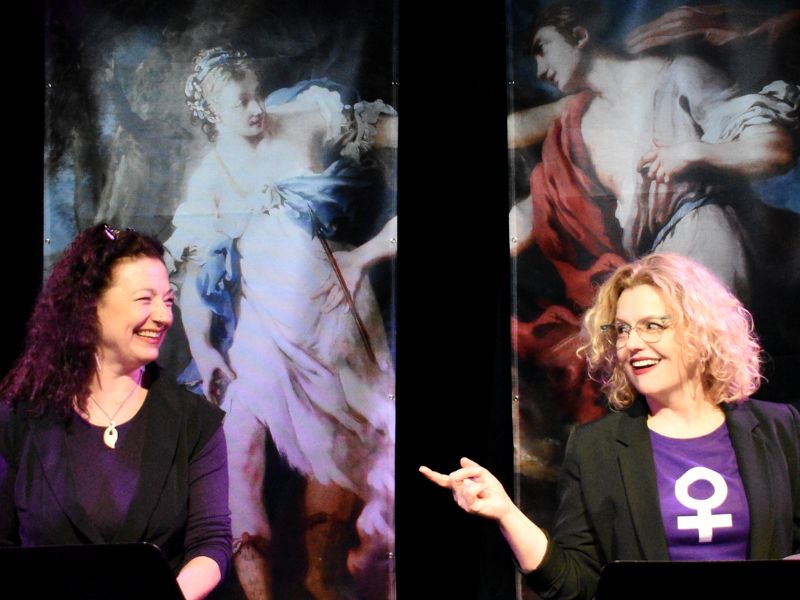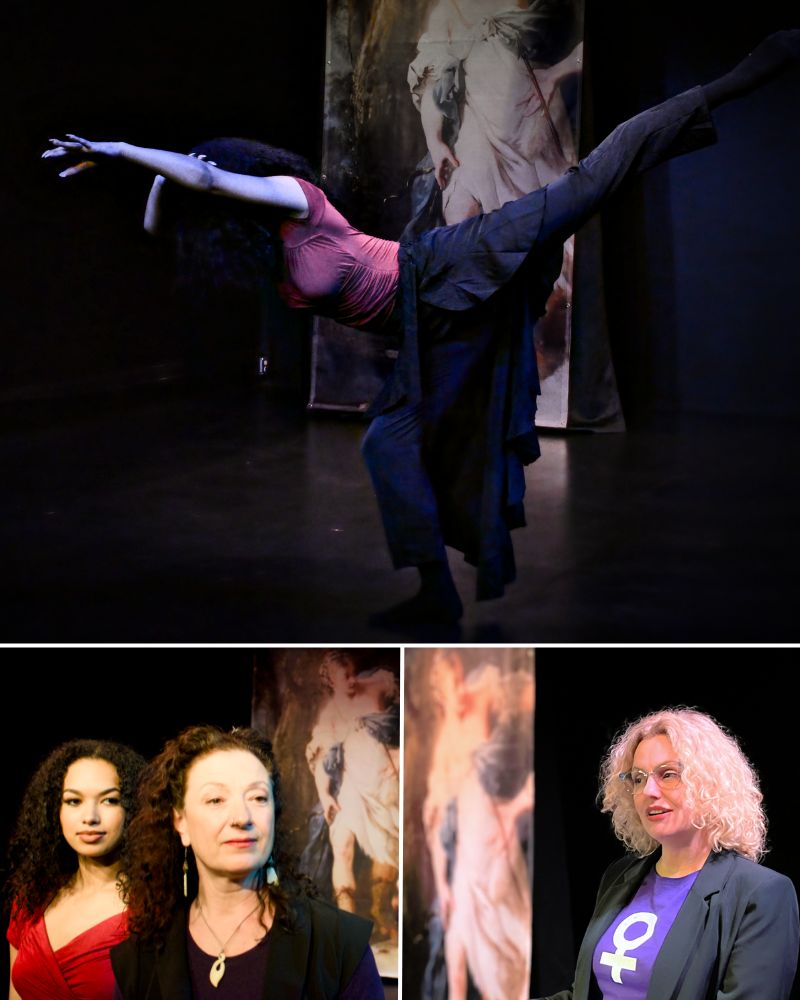Who could be luckier in love than the Goddess of Love herself? Well, in his epic poem Venus and Adonis (1593), Shakespeare says otherwise. Venus, the Roman goddess of love and sex (Aphrodite to the Greeks) had numerous lovers, divine and human. Her husband was the lame blacksmith Vulcan (god of fire); among her lovers were Mars (god of war), Mercury (winged messenger of the gods), and many mortals as well. Her son with Mercury was Cupid (you’ve heard of him).
Based on an account from Ovid’s Metamorphoses, Venus and Adonis was Shakespeare’s first work in print, and wildly popular. The Taffety Punk production, directed by Marcus Kyd, is an erotic and often funny catalog of the contradictions of love. And perhaps, just possibly, a portrait of the artist himself.

Two marvelous actors, Tonya Beckman and Lise Bruneau, are the Narrators of the story. They stand before two panels from François Boucher’s 18th-century painting Venus and Adonis.
The first stanzas set the tone:
Even as the sun with purple-colored face
Had ta’en his last leave of the weeping morn,
Rose-cheeked Adonis hied him to the chase.
Hunting he loved, but love he laughed to scorn.
Sick-thoughtèd Venus makes amain unto him
And, like a bold-faced suitor, gins to woo him.
In Ovid, Adonis is very much in love with Venus; in Shakespeare, he repudiates her. It is not only Venus but love itself that he spurns.
“I know not love,” quoth he, “nor will not know it,
Unless it be a boar, and then I chase it.
’Tis much to borrow, and I will not owe it.
My love to love is love but to disgrace it,
For I have heard it is a life in death
That laughs and weeps, and all but with a breath.
Beckman, whether declaring “I’ll smother thee with kisses” or proclaiming bitterly that “those that love best shall not their loves enjoy” finds a wealth of deep emotion, humor, and seductive whimsy in the text. Bruneau, equally beguiling, explores it with striking vocal ingenuity.
Classically trained dancer Sarina Martinez de Osaba performs several stunning dances as the goddess, to Kathy Cashel’s original music, with choreography by Erin Mitchell Nelson. Bruneau and de Osaba join in a brief duet. The imagery is among Shakespeare’s finest and inspires some of the movement impulses of the choreography.

Among the images are lightning changes of color in the face, prompted by emotion; Adonis’ cheeks “with anger ashy-pale,” or those of Venus “red and hot as coals of glowing fire.” The late English literary critic Caroline Spurgeon surmised that perhaps Shakespeare as a youth was embarrassed by the fact that he was fair and flushed easily.
Venus, who fears for Adonis’ life, begs him to seek less dangerous creatures than the boar. The timid hare perhaps, in an image with Shakespeare’s sensitivity to suffering:
Then shalt thou see the dew-bedabbled wretch
Turn and return, indenting with the way.
Each envious brier his weary legs do scratch;
Each shadow makes him stop, each murmur stay,
For misery is trodden on by many
And, being low, never relieved by any.
The eloquence of Venus, as imagined by Shakespeare, is a vivid expression of female sexuality. Venus’ role as the aggressor is more traditionally associated with men. Venus is hot, Adonis cold. Yet Venus is so powerful as a goddess that she can turn her disappointment into an invocation that wreaks havoc on the nature of love itself.
Shakespeare, too, transforms his life experience. Sonnet 55 begins:
Not marble, nor the gilded monuments
Of princes shall outlive this powerful rhyme…
The unknown young man, to whom the poem is addressed, will shine brightly too because of Shakespeare’s words.
Shakespeare tells him:
So, till the Judgement that you yourself arise,
You live in this, and dwell in lovers’ eyes.
Venus? Shakespeare. Shakespeare? Venus. This production contains an unusually personal vision of the poet himself.
Running Time: About 80 minutes, with no intermission.
Venus and Adonis plays through April 27, 2024, presented by Taffety Punk Theatre Company performing at the Capitol Hill Arts Workshop, 545 7th Street SE, Washington, DC. Purchase tickets ($15 each) online.
Venus and Adonis
By William Shakespeare
THE PLAYERS
Tonya Beckman: Narrator
Lise Bruneau: Narrator
Sarina Martinez de Osaba: Dancer
Production and Design
Director: Marcus Kyd
Choreographer: Erin Mitchell Nelson
Music and Sound: Kathy Cashel
Lighting Designer: Chris Curtis
Costume Consultant: Johnna Presby




